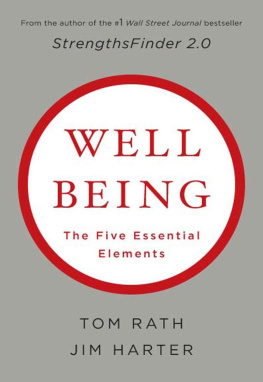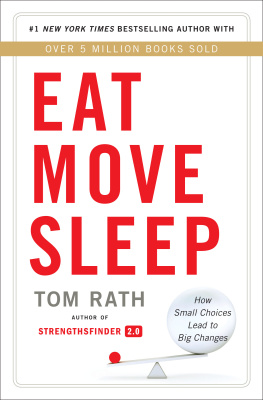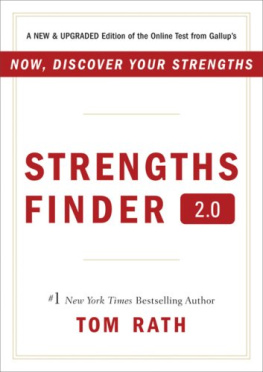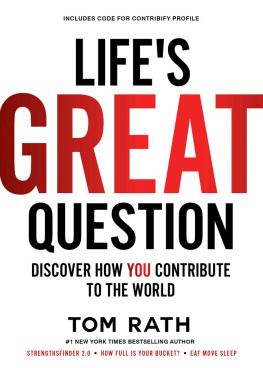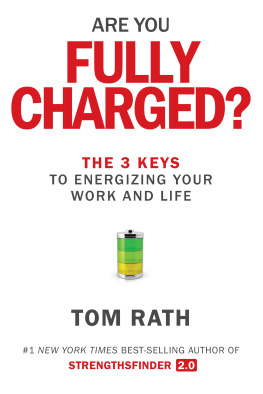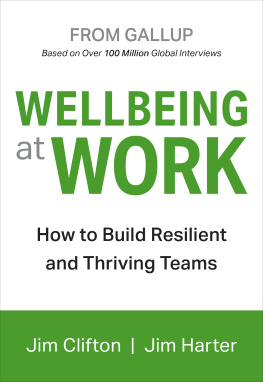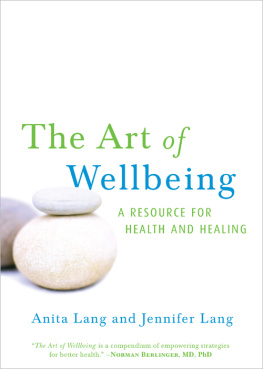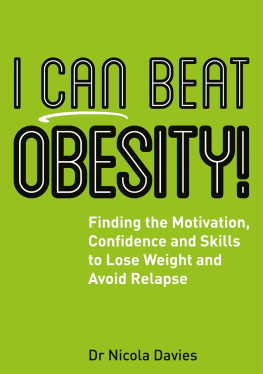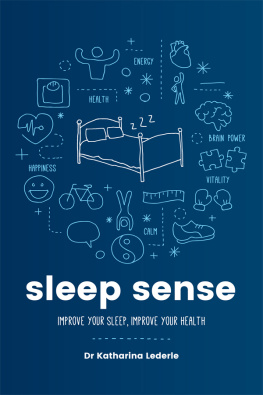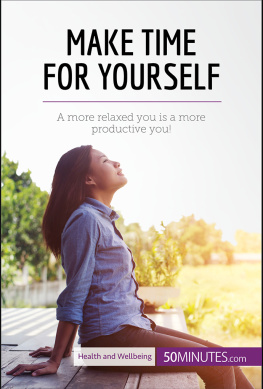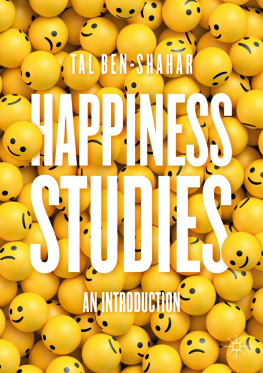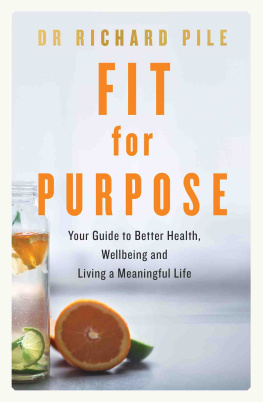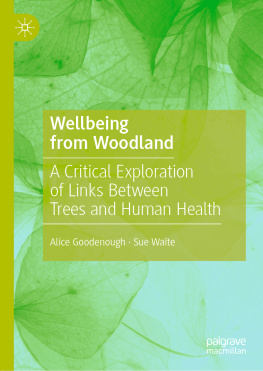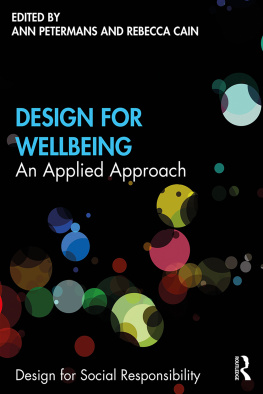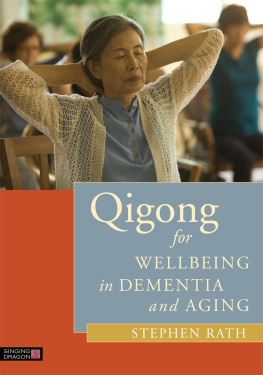To create your Wellbeing account and try the online program, visit: www.wbfinder.com
Click on the box in the top right corner to enter the unique access code that you have received in your Kindle account.
To Ashley and Harper, the source of my daily wellbeing.
To Laurie Dean (1966-2009). Inspiring Community Wellbeing.
Copyright 2010 Gallup, Inc.
All rights reserved, including the right of reproduction in whole or in part in any form.
Gallup, Gallup-Healthways Well-Being Index, Gallup Panel, Gross National Wellbeing, Q12, The Gallup Poll, and Wellbeing Finder are trademarks of Gallup, Inc. All other trademarks are property of their respective owners.
The Q12 items are protected by copyright of Gallup, Inc., 1993-1998. All rights reserved.
Much of what we think will improve our wellbeing is either misguided or just plain wrong.
Contrary to what many people believe, wellbeing isnt just about being happy. Nor is it only about being wealthy or successful. And its certainly not limited to physical health and wellness. In fact, focusing on any of these elements in isolation could drive us to feelings of frustration and even failure.
We are quick to buy into programs that promise to help us make money, lose weight, or strengthen our relationships. Then we spend the next few weeks dedicating our time and energy to that specific plan. Eventually, we give up on these programs when they conflict with other aspects of our lives.
If youve purchased books, watched videos, or attended classes on topics like these, you might have noticed how an intense focus on one area can actually be detrimental to your overall wellbeing. Just think of how many people dedicate an excessive amount of time and energy to their job at the expense of their personal relationships. It might seem easier to treat the critical areas in our lives as if they are independent and unrelated, but theyre not. They are interdependent .
Wellbeing is about the combination of our love for what we do each day, the quality of our relationships, the security of our finances, the vibrancy of our physical health, and the pride we take in what we have contributed to our communities. Most importantly, its about how these five elements interact .
What Makes Life Worthwhile
Gallup scientists have been exploring the demands of a life well-lived since the mid-20th century. More recently, in partnership with leading economists, psychologists, and other acclaimed scientists, we began to explore the common elements of wellbeing that transcend countries and cultures.
As part of this research, Gallup conducted a comprehensive global study of more than 150 countries, giving us a lens into the wellbeing of more than 98% of the worlds population. From Afghanistan to Zimbabwe, we asked hundreds of questions about health, wealth, relationships, jobs, and communities. We then compared these results to how people experience their days and evaluate their lives overall.
In our initial research, we asked people what the best possible future for them would look like. We found that when evaluating their lives, people often give disproportionate weight to income and health: Across the groups we surveyed, good health and wealth were two of the most common responses. Perhaps this is because these things are easy to measure and track over time we can monitor our height, weight, blood pressure, and household income. Yet we do not have a standard way to measure the quality of our careers or the health of our relationships.
So to construct a comprehensive measure of individual wellbeing, Gallup designed an assessment composed of the best questions we have asked over the last 50 years. To create this assessment, the Wellbeing Finder, we tested hundreds of questions across countries, languages, and vastly different life situations.
Upon completion of the research, five distinct statistical factors emerged. These are the universal elements of wellbeing that differentiate a thriving life from one spent suffering. They describe aspects of our lives that we can do something about and that are important to people in every situation we studied.
The Five Essential Elements
These elements are the currency of a life that matters. They do not include every nuance of whats important in life, but they do represent five broad categories that are essential to most people.
The first element is about how you occupy your time or simply liking what you do every day: your Career Wellbeing .
The second element is about having strong relationships and love in your life: your Social Wellbeing .
The third element is about effectively managing your economic life: your Financial Wellbeing .
The fourth element is about having good health and enough energy to get things done on a daily basis: your Physical Wellbeing .
The fifth element is about the sense of engagement you have with the area where you live: your Community Wellbeing .
While 66% of people are doing well in at least one of these areas, just 7% are thriving in all five. If were struggling in any one of these domains, as most of us are, it damages our wellbeing and wears on our daily life. When we strengthen our wellbeing in any of these areas, we will have better days, months, and decades. But were not getting the most out of our lives unless were living effectively in all five.
Although these elements are universal across faiths, cultures, and nationalities, people take different paths to increasing their individual wellbeing. For many people, spirituality drives them in all these areas. Their faith is the most important facet of their lives, and it is the foundation of their daily efforts. For others, a deep mission, such as protecting the environment, inspires them each day. While the things that motivate us differ greatly from one person to the next, the outcomes do not.
There are many ways to create thriving Career, Social, Financial, Physical, and Community Wellbeing. Because these critical elements are within our control, we have the ability to improve them (for example, exercising, spending more time with friends, or using money wisely). However, the single biggest threat to our own wellbeing tends to be ourselves . Without even giving it much thought, we allow our short-term decisions to override whats best for our long-term wellbeing.
Working Against Our Own Best Interests
We know that physical activity will improve our health, yet we skip exercising. Missing one workout wont give us a heart attack or cause a stroke so we let ourselves off the hook for a day.
We know that too much sugar and fried foods are bad for our health. But we grab a handful of candy or chips without even thinking. One french fry cant cause diabetes or obesity, right?
Similarly, we know its important to spend quality time with our friends and family, but when work is pressing, we dont stop to ask a friend how he is doing.
When we think about our personal finances, we often spend instead of saving. Putting money into a retirement plan would yield several times its original value later on, but spending it on an indulgent purchase is so much more appealing right now.
With so many options to satisfy ourselves in the moment, it can be difficult to make the right long-term decisions. It is, after all, in our nature to do things that will provide the most immediate reward. This is wired into our DNA for basic survival. For decades, psychologists have described increases in the ability to delay gratification as a cornerstone of human development from childhood to adulthood.

